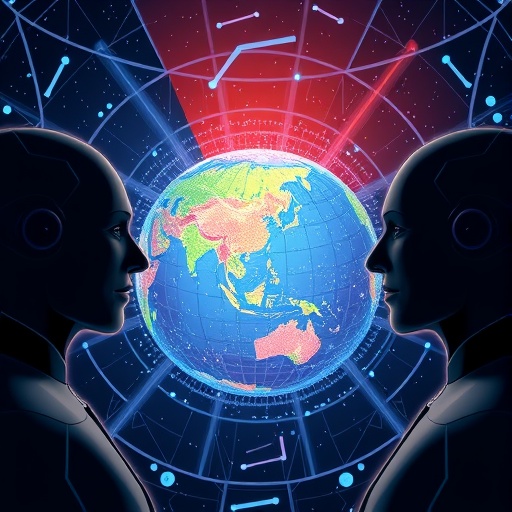In the evolving landscape of international relations, the intersection of artificial intelligence (AI) and diplomacy is emerging as both a powerful tool and a profound challenge. Dr. Donald Kilburg, a veteran of the US Department of State and retired professor, brings critical insights into this development. With over two decades of experience in foreign affairs and a background in experimental psychology, Dr. Kilburg’s reflections underscore the nuanced role AI plays in reshaping how nations interact, negotiate, and protect their interests abroad.
At its core, diplomacy is about human connection—empathy, intuition, and cultural understanding. Dr. Kilburg cautions that while AI can significantly enhance the efficiency of diplomatic tasks, it cannot replicate the subtleties that human diplomats bring to the table. Embassies and missions worldwide have begun employing AI to streamline routine operations such as drafting communications or summarizing extensive policy documents. Yet, the risk lies in an over-reliance on algorithms that lack the capacity to “read the room” or interpret emotional nuances that often underpin high-stakes negotiations.
The transformative potential of AI in diplomacy extends from data processing to advanced threat detection. Capabilities such as combating cyberattacks and identifying deepfakes represent new frontiers that AI techniques uniquely address. However, Dr. Kilburg emphasizes that technology should not displace diplomatic judgment but rather augment it. His field manual, AI Use Cases for Diplomats, provides a comprehensive guide for policymakers and practitioners seeking to leverage AI’s benefits while safeguarding human oversight.
Diplomatic interactions take place on a highly sensitive cultural and political terrain, where missteps can escalate conflicts rather than resolve them. According to Dr. Kilburg, an unmonitored or poorly implemented use of AI carries inherent risks, including the potential to exacerbate tensions. AI systems, especially those trained primarily on Western diplomatic paradigms, may fail to grasp the intricate layers of cross-cultural communication. For example, the emotional gravity carried by deeply personal testimonies in peace negotiations—a grieving mother’s words, for instance—cannot be sufficiently captured or responded to by an algorithm, highlighting the indispensable value of human presence.
To navigate this technologically charged environment, Dr. Kilburg identifies three key areas for diplomatic institutions to prioritize: enhanced training, robust ethical frameworks, and international cooperation. The first involves equipping diplomats with AI fluency that balances technical proficiency with a nuanced understanding of the ethical dilemmas inherent to automated systems. This approach aims to prevent scenarios where machines inadvertently undermine diplomatic principles or sovereignty.
Ethical considerations are paramount in an increasingly AI-integrated diplomatic landscape. Dr. Kilburg advocates for the development of core values rooted both in traditional diplomatic tenets and informed by evolving technological realities. Clear guidelines and boundaries must be established to delineate when AI use is appropriate and when human discretion is irreplaceable. This dual approach ensures that AI acts as a complement to, rather than a substitute for, the human judgment essential to effective statecraft.
Global challenges, including climate change and cybersecurity threats, require unprecedented levels of cooperation facilitated by shared technological advancements. Dr. Kilburg stresses that AI’s promise in fostering such collaboration is contingent on nations committing to equitable access and ethical deployment. Without coordinated international frameworks, the benefits of AI risk being undermined by geopolitical fracturing or unilateral exploitation.
The rapid escalation of digital communications platforms like TikTok and Twitter has altered the diplomatic terrain in profound ways. AI tools now analyze real-time social sentiment and information flows that influence public opinion and national policies. Dr. Kilburg’s insights reveal that diplomats must harness AI’s analytical power to anticipate events and devise more effective negotiation strategies, yet always with an awareness of AI’s current limitations.
Central to Dr. Kilburg’s vision is the notion that technology’s role in diplomacy must be framed through the prism of humanity’s highest aspirations. Diplomats build bridges not just through the transaction of information but by fostering trust and understanding—qualities that no algorithm can manufacture authentically. His cautionary view insists on maintaining the primacy of human empathy as AI systems become more sophisticated and embedded in foreign affairs.
Moreover, Dr. Kilburg recognizes the crucial question on the horizon: “Will tomorrow’s diplomats represent nations—or algorithms?” This question encapsulates the urgency for policymakers to develop governance models that preserve human agency. AI’s integration into diplomacy demands a vigilant approach, balancing innovation with respect for sovereignty, cultural complexity, and moral judgment.
As governments adapt to these technological shifts, training programs within embassies must evolve to cultivate a new breed of diplomats who are as adept with code and data analytics as they are with cultural literacy and negotiation. This synthesis of skills is not merely technical but philosophical, requiring diplomats to negotiate not just with foreign counterparts but also with ethical dilemmas emerging from AI applications.
In conclusion, Dr. Kilburg’s work highlights an essential paradox in 21st-century diplomacy: AI’s vast data-processing power offers new means of understanding and managing the international order, yet diplomacy remains fundamentally a human endeavor. The future will depend on the wisdom of today’s policymakers and diplomats to harness technology in ways that amplify—not undermine—the core human elements that define interactions among nations.
Subject of Research: Use of Artificial Intelligence in Diplomacy and International Relations
Article Title: AI in Diplomacy: Navigating the Intersection of Technology and Human Judgment
Web References: DOI 10.1201/9781003612308
Keywords: Artificial intelligence, AI in diplomacy, ethical frameworks, international relations, diplomacy, machine learning, cultural sensitivity, human judgment, global cooperation, deepfakes, cyber defense, negotiation strategies




